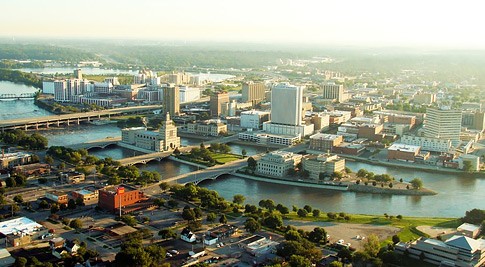
Casinos in Iowa are organizing against a potential new competitor in Cedar Rapids, launching a campaign against adding gambling venues in the state, reports KCRG. It is believed that while a casino in Linn County would increase revenue for the state, it would also substantially hurt nearby existing gaming facilities.
The city of Cedar Rapids needs three of five commissioners to approve a potential plan: in November 2021, 55% of Linn County voters approved a referendum for a casino in the region. The board, when composed of different commissioners, had previously voted down proposals for a Cedar Rapids casino in 2017 and 2014.
In a written statement, Dan Kehl, CEO of Elite Casino Resorts, called for support to Iowa’s gambling industry, which he claims needs to find protection from outside competition coming out of the state. But he also said the focus should be on strengthening current casinos to compete, instead of adding new venues to the market.
“It’s like deja vu all over again,” Kehl wrote in the statement, according to the cited news source. “The commission has studied this issue diligently. But the fact is, a Cedar Rapids casino comes primarily at the expense of Riverside, Waterloo and Meskwaki. We’ve invested heavily in our properties to make them attractive to our guests.”
The issue is particularly pressing for Elite Casino Resorts, which has plans in place to open new casinos in Nebraska and Illinois. Its casinos in Riverside, along with the Isle Casino in Waterloo, could potentially lose revenue to a Cedar Rapids casino.
The possibility of a Cedar Rapids development has proved to be a controversial one. While studies suggest it would “cannibalize” the in-state market, supporters claim this could be outweighed by benefits to overall gaming revenue amid heightened competition brought by neighboring states expanding gambling.
A socio-economic analysis by the Spectrum Gaming Group released last week showed that, as Nebraska moves forward with plans to construct casinos along Iowa’s western border, the increased competition would lead to a significant loss in revenue for Iowa’s gaming industry.
The study predicted major losses in revenue for the state by 2025, anticipating casinos in Council Bluffs and Sioux City would face stiff competition. Council Bluffs casinos as the most at-risk, given 80% of their gaming revenue comes from Nebraska residents.
But Cedar Rapids officials hope this will finally lead to regulators approving a casino in the city, despite the “cannibalization” argument, reports The Gazette. The casino development could bring a solution for Iowa to stave off competition: while it would take $61 million from existing casinos in the market, it would provide a net commercial gaming revenue gain to the state of $51 million, according to a report from the Innovation Group.
“Knowing that the commissioners have an eye on competition, looking at these numbers that have improved so greatly since the last time, I have to ask if conditions aren’t right right now, I’m not sure when they would be,” Cedar Rapids Mayor Tiffany O’Donnell said in an interview at the Prairie Meadows Casino, Racetrack and Hotel, reports the cited news source.
State regulators, which commissioned studies to understand the potential impact of a Linn County casino and to assess a possible market oversaturation, have so far given little indication as to what a final decision would be. Incremental revenue to the state has been described as an important factor when awarding a license, but others are being considered as well.
Cedar Rapids residents ranked 15th in the state for gambling population, despite the city not having a casino. Studies show Cedar Rapidians are gambling, currently going to other cities’ casinos, which would make a development in the city potentially profitable. City Manager Jeff Pomerantz said he is optimistic about getting the commission’s approval this time around.
“Let’s bring in the completion we’re ready for in Cedar Rapids,” Pomerantz said, according to KCRG. “We want to benefit the state, we want to benefit the community, I think the competitive forces are critical when others are trying to take our businesses into other states.”













